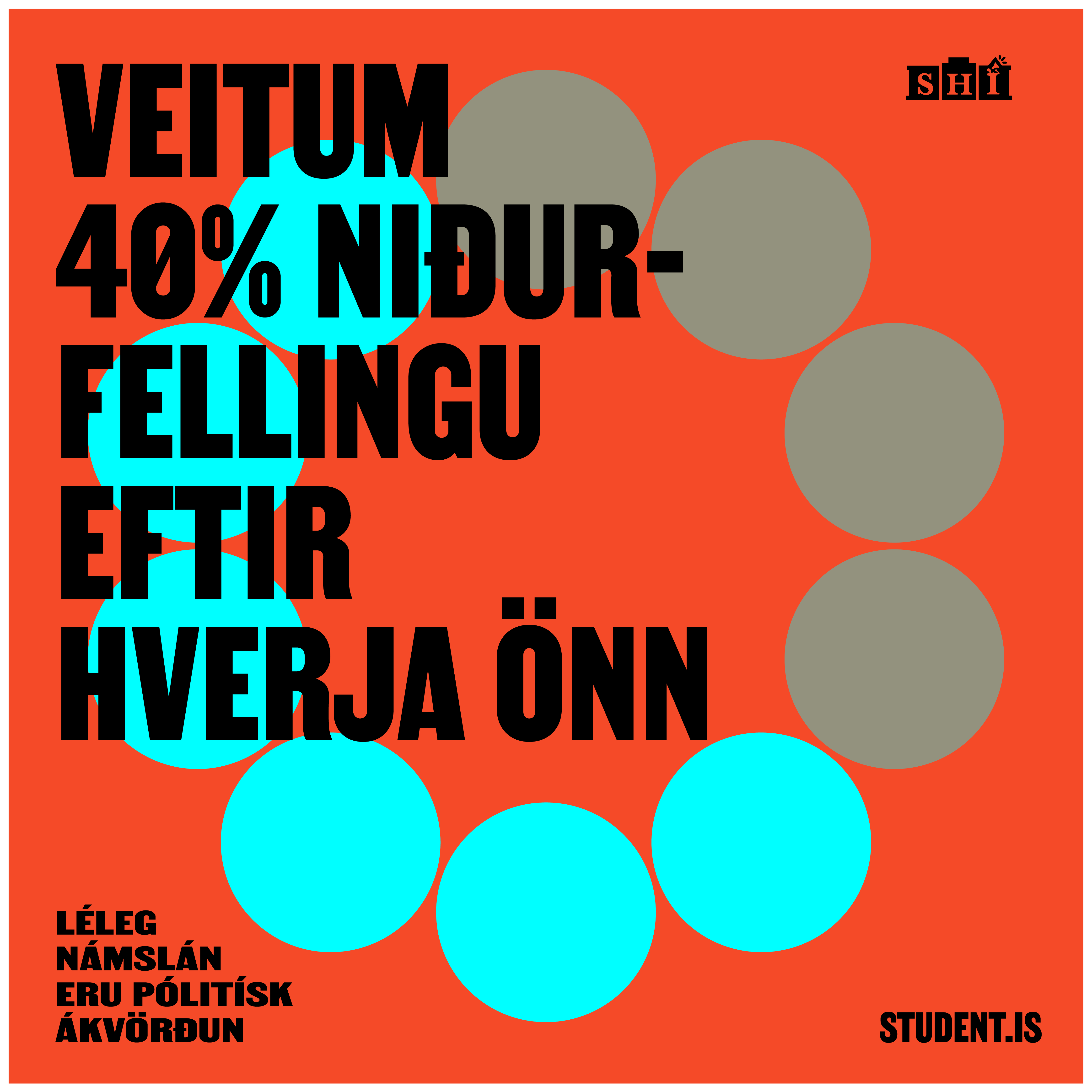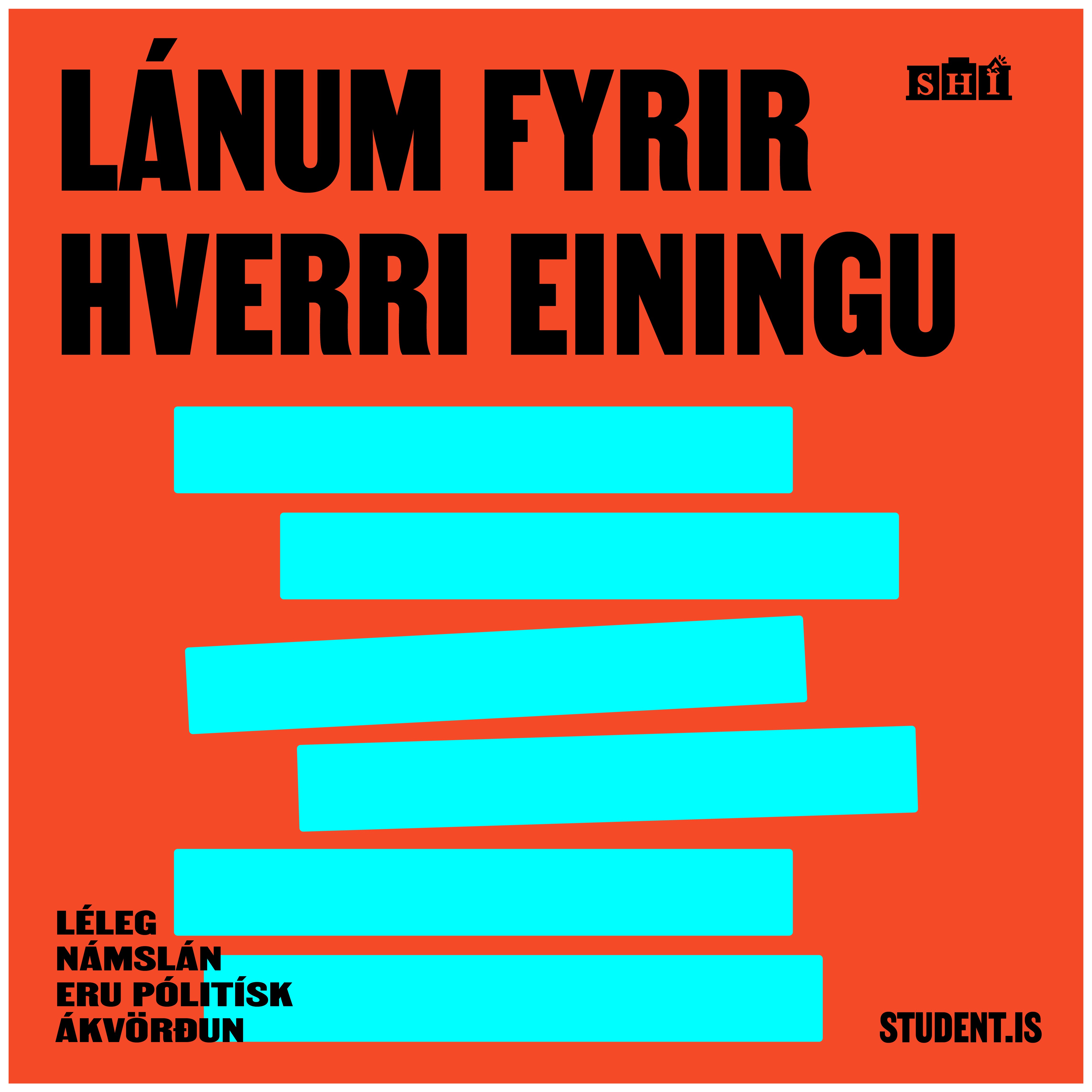February 16, 2024
Bad student loans are a political decision
In 2020, a new law was passed in Alþingi, which repealed the old Icelandic Students’ Loan Fund (LÍN) and established a new system, the Students’ Fund (MSNM). It was decided that the law would be revised after the fall session of 2023, and that work is now in full swing.
A report prepared by the Ministry of Higher Education has been published on the assessment of the revision of the law on MSNM. Listed here below are the points that the Student Council of the University of Iceland (SHÍ) considers necessary to change at the 2024 spring session in order to take a real step towards improving student conditions.
Most students are familiar with the idea of wanting to avoid student loans if possible, but it doesn’t have to be that way. The goal of student loans is to ensure equal access to education. The government can easily create a system where student loans are not dreadful.
Lower interest rate ceiling
Interest rates on loans provided by MSNM can now reach a maximum of 4% for indexed loans and 9% for non-indexed loans.
THE INTEREST RATE CEILING SHOULD BE STRONG
For the longest time, government support for students consisted of providing loans with low interest rates. This is what separated student loans from other loans and made student loans offer the best terms.
CHANGED BUT NOT IMPROVED
With the 2020 law, a 30% cancellation of the principal amount was added, but the interest rates increased enormously as a result. This did not include a real increase in funding for students in Iceland. In fact, the report published by the Ministry of Higher Education in 2023 states that in many cases the new law provides worse conditions than the old system.
IRREGULAR GROWTH ENVIRONMENT
In Iceland, there is a very fluctuating interest rate environment, which means that those who take out student loans have no idea of the interest they will end up paying on the loans. The interest rate eats up the cancellation, so the government’s grant is significantly reduced. This uncertainty must be limited.
CAN’T WE ALL AGREE?
In the report on the revision of the MSNM Act, the Ministry of Finance and Economy has pointed out that there is a need to reduce the interest rate risk of students after completing their studies. Also, the executive director of MSNM has considered whether there may be a reason to lower the interest rate ceiling in a message to the Ministry of Higher Education, Industry and Innovation, as high interest rates on student loans reduce the incentive to seek support from the state in order to study and even have a direct deterrent effect.
STUDENTS ALWAYS KNEW THIS
When the student loan system was being changed, there was no interest rate ceiling to begin with. It wasn’t until the students pointed out that it was unacceptable in such an irregular interest rate environment. This is one example of how important it is for the government to listen to students’ suggestions because we are the group that uses the student loan system.
STUDENTS SHOULD NOT PAY INTEREST SURCHARGES
From the beginning, students have strongly objected to the interest surcharges on student loans. The Icelandic government managed to cover student loan defaults for approx. 70 years until the new law on MSNM took effect. It is the government’s political decision to pass it on to the students. The interest surcharges increases students’ risk, as the Ministry of Finance and Economy has pointed out. It is simply not justified for the government to make students bear the costs of other borrowers’ defaults.
Offer a 40% discount after each semester
Right now, you can get a 30% cancellation on your student loan principal amount if you graduate on time. The Student Council proposes that the grant be increased from 30% to 40% following the Norwegian model. In Norway, a grant is awarded in the form of a 25% cancellation of the loan principal amount at the end of each term. However, the grant is only available for the credits that have been completed, and it therefore creates an incentive to complete studies. In addition, a 15% cancellation is granted at the end of studies in Norway.
UNCERTAINTY
In the current system, a student cannot know for sure whether they will receive a 30% cancellation until after their studies. Such uncertainty is both repulsive, stressful and discouraging from university studies. If the borrower does not meet the conditions regarding educational progress in order to receive a cancellation of the principal amount, the repayment terms are in most cases as bad as for apartment loans.
THE NEW SYSTEM HAS FAILED
Due to the uncertainty of growth and possible cancellations, it may sound more sensible for students to work alongside school, despite the fact that it can adversely affect academic performance, learning speed and mental health, to name a few.
TRANSPARENCY
If part of the cancellation were to be received monthly, students could see the scholarship even. Then there would also be less risk if something happened that would cause you to have to delay your studies.
EQUAL RIGHTS
Family members, students with learning disabilities or a mother tongue other than Icelandic are more likely to have to postpone their studies or take a study break for some reason. In the current system, people belonging to these groups are therefore less likely to benefit from scholarships from the state. Where is the equality in that?
HIGHER GRANTS
With a 40% reduction, the state would be providing a higher subsidy to students. University education thus becomes a better option for students, a more diverse group has access to education that only has a positive effect on Icelandic society and the Icelandic economy.
Loan per credit
In Iceland, students must be enrolled in at least 22 credits to qualify for a student loan. If a student fails the assessment in all 22 units, they must repay the entire loan immediately.
In Norway, there are neither time limits nor requirements for the minimum number of credits per semester to qualify for a 25% cancellation of the principal amount. The cancellation is only available for completed units, but borrowers will nevertheless receive a loan for all units taken, regardless of academic performance.
DIVERSE STUDENTS
Different programs suit different people. Students are diverse and live in various situations. It is important that the student loan system supports all students without discrimination. The current arrangement excludes those who do not have the opportunity to take more than 22 credits.
WORSE STUDENT LOANS FOR WORSE STUDENTS
If a student fails a 10-credit course, they are no longer entitled to student loans and may have to repay the entire loan for that semester. We propose that loans be provided per unit, allowing students to access loans for the units they take, regardless of whether they fail or pass the assessment.
CAN WE NOT DO THIS BETTER?
A student loan system that fails to achieve its goals of providing equal opportunities for learning and facilitating educational progress results in significant costs for the treasury and society. The connection between Iceland’s high employment rate among students and the low progress in university studies is revealing. This leads to high operating costs, which are compounded by the financial and non-financial costs resulting from unequal opportunities for learning and low levels of education. We can no longer afford to have one of the lowest levels of education among OECD countries.
Only part of the student council’s suggestions has been listed here, but the council has issued a clear policy regarding the revision of the law on the Student Education Fund, which can be accessed here.



